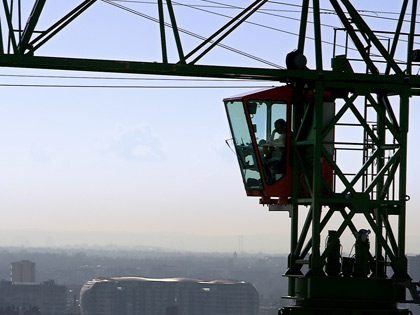Review: The Solitary Life of Cranes

Eva Weber’s The Solitary Life of Cranes is a thought-provoking journey above London and its surrounds, as seen from the perspective of crane drivers. Living in this crazy, frenetic, whirlwind of a city, we see cranes all the time, their seemingly static, spindly arms breaking up the regular flow of the city’s skyline. Rarely would we think about the perspective of the man at the other end, the operator of this city fixture. Never would we dream that he may already know all about us!
We learn early on in this film that crane drivers are, due to the nature of their work, anonymous. They climb the tower and sit in their glass boxes from sunrise to sunset, sometimes hours either side. Occasionally someone may become conscious of their existence, but all they see at best is a pair of feet, not personified. Narrating the story, their observations, are the voices of these men who spend their working days hundreds of feet above the city, but we never see their faces; by the end of the film, there is a curiosity, almost a frustration, at not having seen them. But this is in keeping with the theme; we would never even hear their voices if it weren’t for this film.
The film takes us from the beginning of a day, the sunrise, with the drivers describing the beauty of those first rays emerging from below the city’s edge, then the whole sky filling with light. Immediately we get a sense of the personalities of these men, as they begin to describe their experiences in the cranes, the procession of thoughts, impulses, ideas that wade through their minds as they see the city heave and shift relentlessly through its day and night cycle. They describe their impressions, the city’s pace speeding and slowing depending on the time of day or night, the people like ants scurrying urgently in all directions, the ebb and flow of the city’s energy, like a giant, living, breathing creature. One driver expresses his desire to interfere, to change the path of an office worker who takes the same route at the same time every day; it’s as though he feels like he might interfere with ‘the way of all things’, put a spanner in the works and provide that person with a fresh perspective. But he can’t, as he is hundreds of metres in the air, merely an observer. “I’m a part of your life but you don’t know it,” remarks one man, speaking about how it feels to pass someone on the street that he’d seen every day for weeks on end.
The ascent into the crane is portrayed almost like stepping through a portal in another world, which, for the drivers, it is. One man remarks that before he was a driver, he couldn’t believe that people would happily isolate themselves for hours at a time like this, and he wondered how they didn’t feel lonely. Far from lonely, the crane is revealed as the best place from which to perform a study of social interaction, a study of people, and from what we can gather in this film, it is fascinating.
Enter the world of the crane driver, his own master, taking direction from the ground below via a radio, but otherwise free to experience the world from on high. An elderly woman hovering her floor naked at 3am; a couple cleaning their balcony in the afternoon sun; a child in a buggy waving up at the driver, the only one to notice him; a young girl and boy in a playground. All these snippets of people’s lives are revealed to the driver as he sits in his crow’s nest. There is clearly so much to learn from people’s interactions, and these men see the same people, day in and day out, walking the same routes, sometimes getting wet in the rain, smoking their cigarettes, having their conversations, living their lives. And none of them, except for a few children who are not yet possessed by the rush and stress of the city and adult life, notice the solitary crane above. No one thinks that there might be a man inside, someone with a personality, with thoughts and feelings, doing his job, and learning about people.
Weber’s finely produced, superbly edited film is a unique and striking insight into a world of which most of us would be totally unaware.
Katharina Chase
London-based Australian writer, linguist and social historian
To read our interview with director Eva Weber, click here.
Join the conversation and let us know what you think about the film


